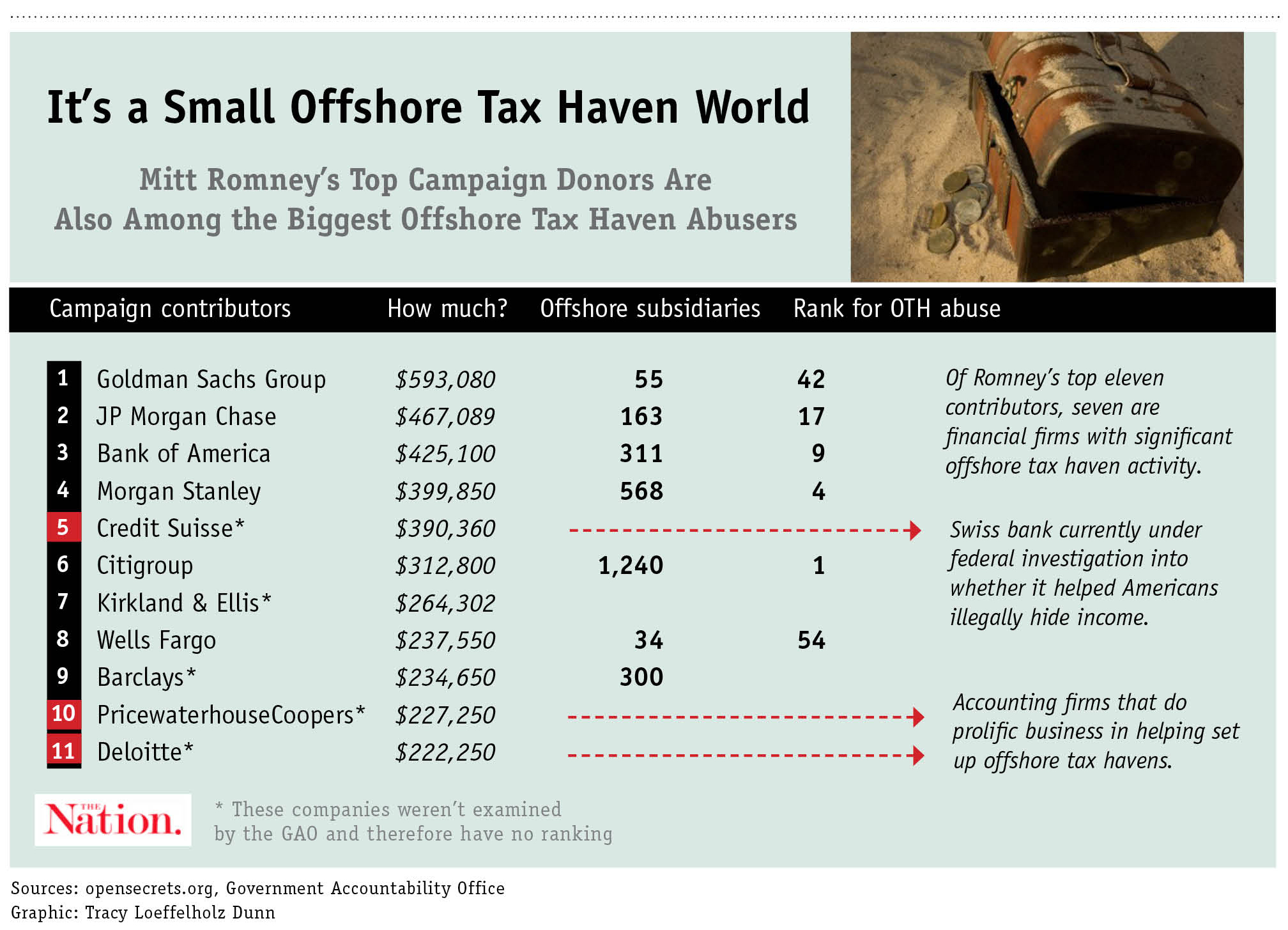Mitt Romney’s mysterious financial holdings have been the topic of furious discussion this week, after a Vanity Fair investigation detailed how significant amounts of the Republican presidential candidate’s fortune may be parked in offshore bank accounts in low- or no-tax countries, allowing Romney to not only obscure how much he is actually worth but avoid paying the federal taxes he would otherwise owe.
While it’s extremely unusual for someone who wants to be president to abuse offshore tax havens like this, it’s an all too common practice for many major American companies—and is most popular in the financial sector from which Romney comes.
And perhaps not so mysteriously, some of the biggest abusers of offshore tax havens—along with some of the chief facilitators of this practice—seem to have gravitated to Romney’s re-election effort. Of the his campaign’s top eleven contributors, seven are financial firms with significant offshore tax haven activity.
Of the four that do not have extensive tax havens themselves, two are accounting firms that do prolific business in helping set up those havens, and one is a Swiss bank where employees are currently under a federal investigation for helping to facilitate potentially illegal abuse of offshore tax havens.
So while Romney is currently downplaying his use of offshore tax havens, maintaining those evasion structures is no doubt a top priority of the people and industries funding his campaign:

(Note that these companies did not give checks directly to the campaign, which is forbidden, but rather the money comes through the company’s political action committees and employees.)
As you can see, Wall Street is a big contributor to the Romney campaign, and is also heavily invested in the practice of moving money to tax havens. The Vanity Fair piece notes that “one cannot properly understand Wall Street’s size and power without appreciating the central role of offshore tax havens.” With massive inflows and outflows of cash and incentives to avoid paying taxes on it, along with strong legal and public relations incentives to sometimes hide the source of the money, offshore tax havens are invaluable to the financial sector.
Citigroup, the Romney campaign’s sixth-highest contributor, is the worst American abuser of offshore tax havens, according to the Government Accountability Office—with a stunning 1,240 foreign subsidiaries. Morgan Stanley and Bank of America, both top Romney contributors, are also in the top ten offshore tax haven abusers listed in the GAO report, which examined offshore tax haven use by the country’s largest 100 companies.
Popular
"swipe left below to view more authors"Swipe →
Among Romney’s top donors there’s also PricewaterhouseCoopers and Deloitte, two of the “Big Four” American accounting firms. They all play a crucial role in setting up offshore tax havens for clients and no doubt derive massive incomes from it. As John Christensen, director of the Tax Justice Network, has explained, “The Big Four are deeply embedded in the tax haven world. They’re major players in shaping the laws and regulations of these places and encouraging clients—high net worth individuals and corporate clients—to maximize their tax avoidance through such places.”
Then you have Credit Suisse—an actual Swiss bank where employees are under investigation by the Department of Justice for helping clients set up accounts in offshore tax havens. According to an indictment, “as of late 2008 Credit Suisse was maintaining thousands of secret accounts for U.S. customers with as much as $3 billion in assets.” Tax havens are legal, but failing to declare them to the IRS is not, and the Credit Suisse clients, apparently with the help of bank employees, were not. The indictment charges that bank employees “knew and should have known they were aiding and abetting U.S. customers in evading their U.S. income taxes.”
So that is ten of the Romney campaign’s top eleven donors deeply involved in the practice of creating offshore tax havens for the purpose of shielding money from income taxes and scrutiny. (The only one apparently not involved in that practice is the law firm Kirkland & Ellis, which most famously defended BP in litigation over the Deepwater Horizon spill).
Offshore tax havens are as damaging to the federal government and American taxpayers are they are lucrative for the culprits. They deprive the government of as much as $100 billion per year in tax revenue, according to one study by the US Public Interest Research Group, which means it costs the average taxpayer $434 per year.
But with so many offshore tax haven abusers and facilitators bankrolling his campaign—not to mention his personal penchant for the practice—how likely is it President Romney would push for reform?
Nation DC intern Soumya Karlamangla contributed research to this report.


